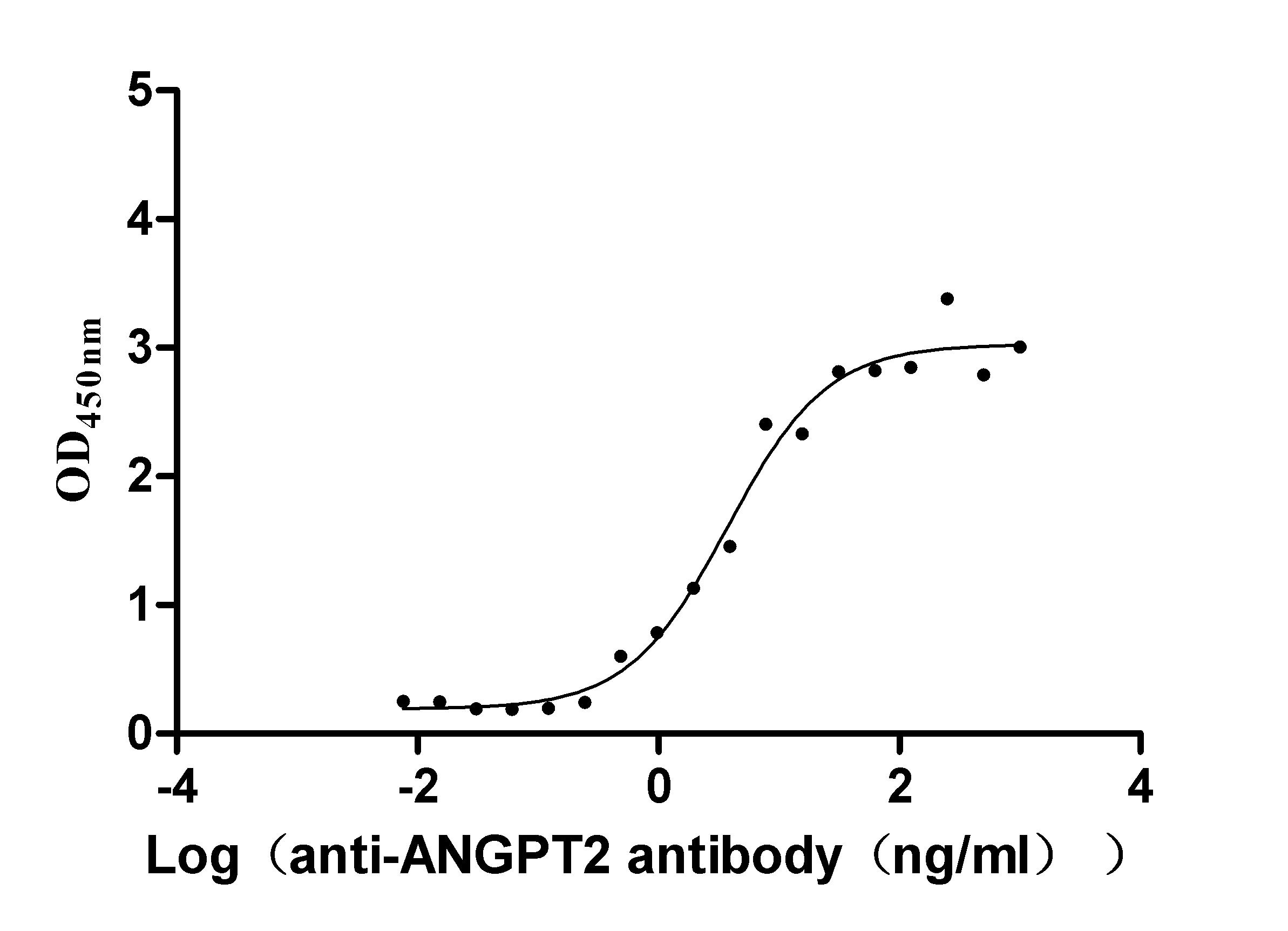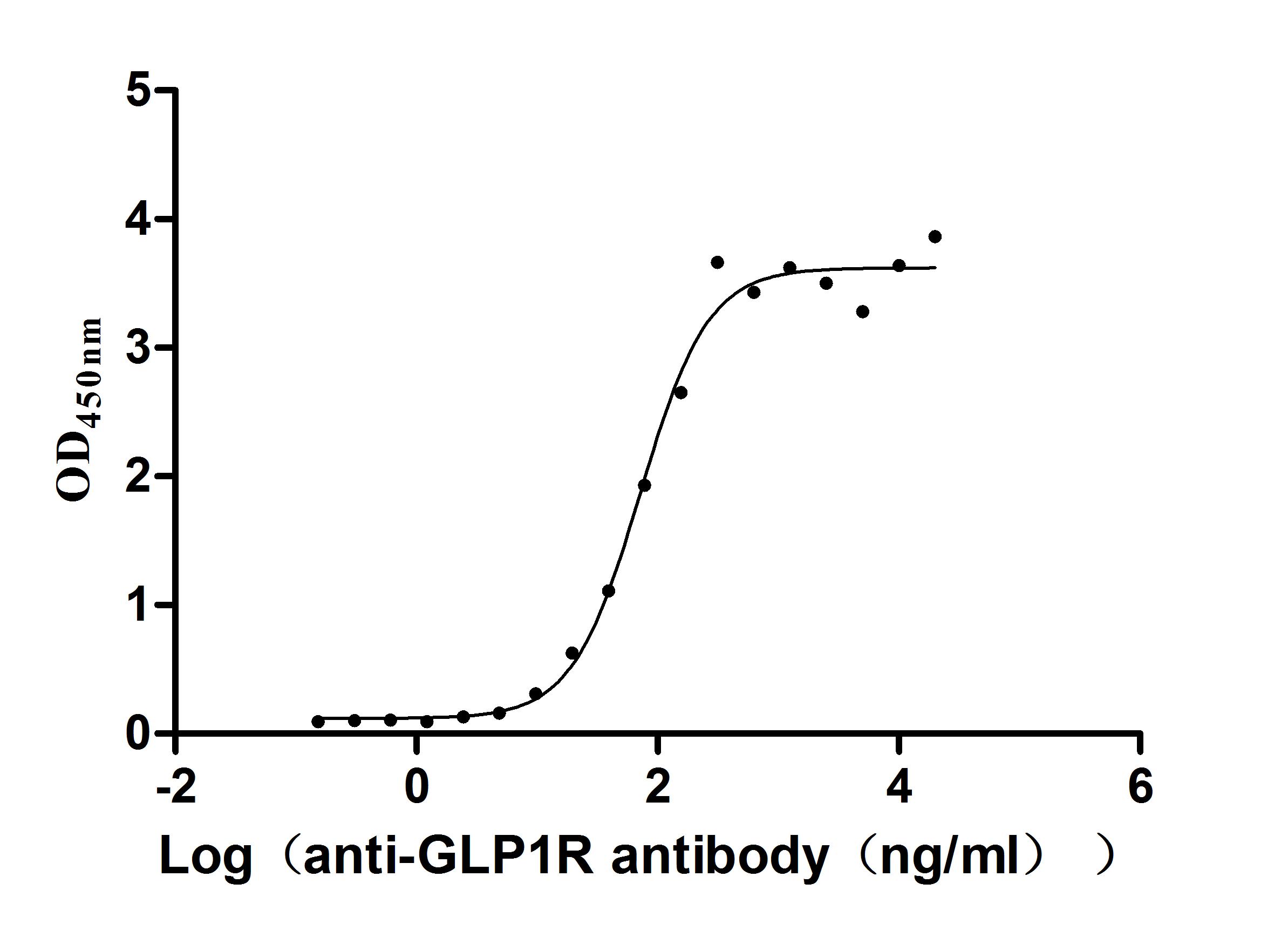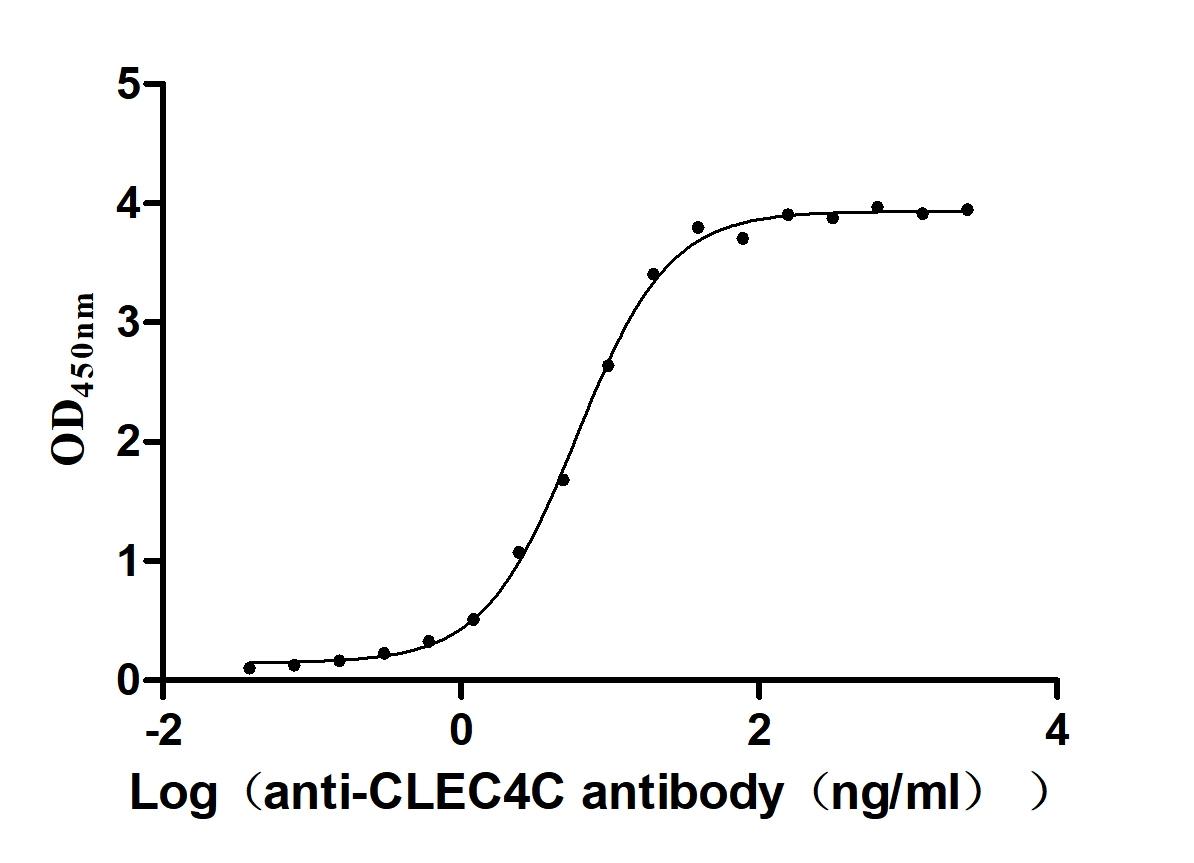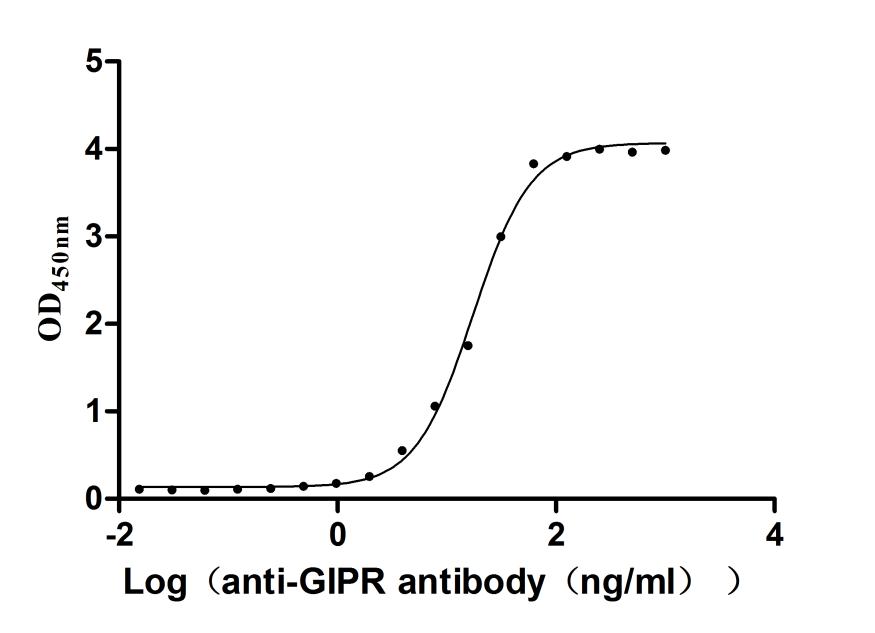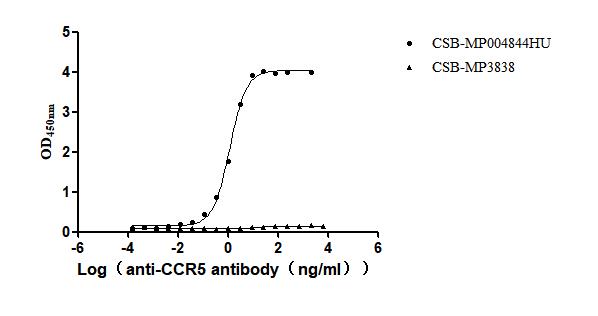Recombinant Human Protocadherin-15 (PCDH15), partial
-
中文名称:人PCDH15重组蛋白
-
货号:CSB-YP853490HU
-
规格:
-
来源:Yeast
-
其他:
-
中文名称:人PCDH15重组蛋白
-
货号:CSB-EP853490HU
-
规格:
-
来源:E.coli
-
其他:
-
中文名称:人PCDH15重组蛋白
-
货号:CSB-EP853490HU-B
-
规格:
-
来源:E.coli
-
共轭:Avi-tag Biotinylated
E. coli biotin ligase (BirA) is highly specific in covalently attaching biotin to the 15 amino acid AviTag peptide. This recombinant protein was biotinylated in vivo by AviTag-BirA technology, which method is BriA catalyzes amide linkage between the biotin and the specific lysine of the AviTag.
-
其他:
-
中文名称:人PCDH15重组蛋白
-
货号:CSB-BP853490HU
-
规格:
-
来源:Baculovirus
-
其他:
-
中文名称:人PCDH15重组蛋白
-
货号:CSB-MP853490HU
-
规格:
-
来源:Mammalian cell
-
其他:
产品详情
-
纯度:>85% (SDS-PAGE)
-
基因名:PCDH15
-
Uniprot No.:
-
别名:PCDH15; USH1F; Protocadherin-15
-
种属:Homo sapiens (Human)
-
蛋白长度:Partial
-
蛋白标签:Tag type will be determined during the manufacturing process.
The tag type will be determined during production process. If you have specified tag type, please tell us and we will develop the specified tag preferentially. -
产品提供形式:Lyophilized powder
Note: We will preferentially ship the format that we have in stock, however, if you have any special requirement for the format, please remark your requirement when placing the order, we will prepare according to your demand. -
复溶:We recommend that this vial be briefly centrifuged prior to opening to bring the contents to the bottom. Please reconstitute protein in deionized sterile water to a concentration of 0.1-1.0 mg/mL.We recommend to add 5-50% of glycerol (final concentration) and aliquot for long-term storage at -20℃/-80℃. Our default final concentration of glycerol is 50%. Customers could use it as reference.
-
储存条件:Store at -20°C/-80°C upon receipt, aliquoting is necessary for mutiple use. Avoid repeated freeze-thaw cycles.
-
保质期:The shelf life is related to many factors, storage state, buffer ingredients, storage temperature and the stability of the protein itself.
Generally, the shelf life of liquid form is 6 months at -20°C/-80°C. The shelf life of lyophilized form is 12 months at -20°C/-80°C. -
货期:Delivery time may differ from different purchasing way or location, please kindly consult your local distributors for specific delivery time.Note: All of our proteins are default shipped with normal blue ice packs, if you request to ship with dry ice, please communicate with us in advance and extra fees will be charged.
-
注意事项:Repeated freezing and thawing is not recommended. Store working aliquots at 4°C for up to one week.
-
Datasheet :Please contact us to get it.
相关产品
靶点详情
-
功能:Calcium-dependent cell-adhesion protein. Essential for maintenance of normal retinal and cochlear function.
-
基因功能参考文献:
- Novel 4658delT PCDH15 mutation was identified in a family with nonsyndromic hearing loss. PMID: 29692870
- rs2045145 associated with more European female facial profile PMID: 29301965
- We found a remarkable genetic heterogeneity in the studied families with USH1 with a variety of mutations, among which three were novel. These novel mutations will be included in the NADf mutation screening chip that will allow a higher diagnosis efficiency of this extremely genetically heterogeneous disease. PMID: 27440999
- PCDH15 polymorphism is associated with extraversion. PMID: 27918536
- Results present structures of a protocadherin-15 fragment featuring a non-canonical linker region that exhibits increased flexibility without compromising mechanical strength. PMID: 28238533
- This study confirms that genetic variations in PCDH15 modify the susceptibility to noise-induced hearing loss development in humans. PMID: 28292353
- Results uncovered a novel interaction between MYO3A and PCDH15 shedding new light on the function of myosin IIIA at stereocilia tips. PMID: 26841241
- no statistically significant association between any rare, heterozygous PCDH15 point variants and schizophrenia or autism spectrum disorders was found PMID: 27058588
- PCDH15 p.Asp1010Gly variant probably modified the phenotypic expression of the 7511T>C mutation in MT-TS1 PMID: 26279247
- The novel homozygous mutation in a family segregating non-syndromic hearing loss family supports previous reported observations that PCDH15 does not only causes Usher syndrome type 1F, but also DFNB23. PMID: 25930172
- PCDH15 or DFNB59 variants are associated with poor CI performance, yet children with PCDH15 or DFNB59 variants might show clinical features indistinguishable from those of other typical pediatric cochlear implant recipients. PMID: 26166082
- PCDH15 has several alternate cytoplasmic domain exons and differentially spliced isoforms may function redundantly PMID: 25307757
- Genetic variations of PCDH15 and their interactions with occupational noise exposure are associated with genetic susceptibility t onoise-induced hearing loss. PMID: 25462672
- Patients lacking PCDH15-CD2 isoform are profoundly deaf. PMID: 24940003
- Single nucleotide polymorphisms spanning a 9-kb region centered on exon 11 of the protocadherin 15 ( PCDH15 ) gene were found to be associated with irritable bowel syndrome in Australian, United States, and Swedish populations. PMID: 24797007
- Alberta Hutterites with Usher syndrome type I do not carry the exon 10 mutation in the PCDH15 gene. PMID: 22690115
- Seven different point mutations, five novel, were detected in PCDH15 gene in Spanish patients with Usher syndrome type I. PMID: 22815625
- a combination of PCR-based mutation screening, together with deletion and duplication analysis, is mandatory for the accurate screening of the PCDH15 gene in Usher patients. PMID: 20538994
- Study suggests that PCDH15 is associated with lipid abnormalities. PMID: 19816713
- A founder mutation, R245X, of the PCDH15 gene among Ashkenazi Jews is a cause of Type 1 Usher Syndrome. PMID: 12711741
- Here we report that non-syndromic recessive hearing loss (DFNB23) is caused by missense mutations of PCDH15. PMID: 14570705
- characterizeation of a new allele of the protocadherin 15 gene (designatedPcdh15(av-6J); Young Pcdh15(av-6J) mice are unresponsive to auditory stimulation and show circling behavior indicative of vestibular dysfunction PMID: 16887306
- Analysis of three large deletions revealed that all six breakpoints are different. Breakpoint junction was identified in one patient and four other breakpoints were mapped to 4 kb. PMID: 17277737
- Both mouse and human protocadherin 15 genes have complex genomic structures and transcription control mechanisms. PMID: 17706913
- Humans with PCDH15 (USH1F), USH2A or GPR98 (USH2C) had a similar retinal phenotype to MYO7A PMID: 18463160
- study of PCDH15 mutations in nonsyndromic deafness DFNB23 and type 1 Usher syndrome PMID: 18719945
- missense mutations in conserved motifs of PCDH15 cause nonsyndromic hearing loss PMID: 19107147
- One SNP in PCDH15 (rs7095441) and two SNPs in MYH14 (rs667907 and rs588035), resulted in significant associations in the Polish sample set and significant interactions with noise exposure level in the Swedish sample set. PMID: 19183343
- Mutations cause Usher syndrome type 1F. Protocadherins are essential for maintenance of normal retinal and cochlear function. PMID: 11487575
显示更多
收起更多
-
相关疾病:Usher syndrome 1F (USH1F); Usher syndrome 1D/F (USH1DF); Deafness, autosomal recessive, 23 (DFNB23)
-
亚细胞定位:Cell membrane; Single-pass type I membrane protein.; [Isoform 3]: Secreted.
-
组织特异性:Expressed in brain, lung, kidney, spleen and testis. Found also in the inner and outer synaptic layers, and the nerve fiber layer in adult and fetal retinas. Found in the supporting cells, outer sulcus cells and spiral ganglion of fetal cochlea. Expressed
-
数据库链接:
Most popular with customers
-
Recombinant Dog Angiopoietin-2 (ANGPT2) (Active)
Express system: Mammalian cell
Species: Canis lupus familiaris (Dog) (Canis familiaris)
-
Recombinant Human Glucagon-like peptide 1 receptor (GLP1R), partial (Active)
Express system: Mammalian cell
Species: Homo sapiens (Human)
-
Recombinant Macaca fascicularis C-type lectin domain family 4 member C(CLEC4C), partial (Active)
Express system: Mammalian cell
Species: Macaca fascicularis (Crab-eating macaque) (Cynomolgus monkey)
-
Recombinant Human Gastric inhibitory polypeptide receptor(GIPR),partial (Active)
Express system: Mammalian cell
Species: Homo sapiens (Human)
-
Recombinant Human Urokinase-type plasminogen activator(PLAU) (Active)
Express system: Mammalian cell
Species: Homo sapiens (Human)
-
Recombinant Human C-C chemokine receptor type 5 (CCR5)-VLPs (Active)
Express system: Mammalian cell
Species: Homo sapiens (Human)


